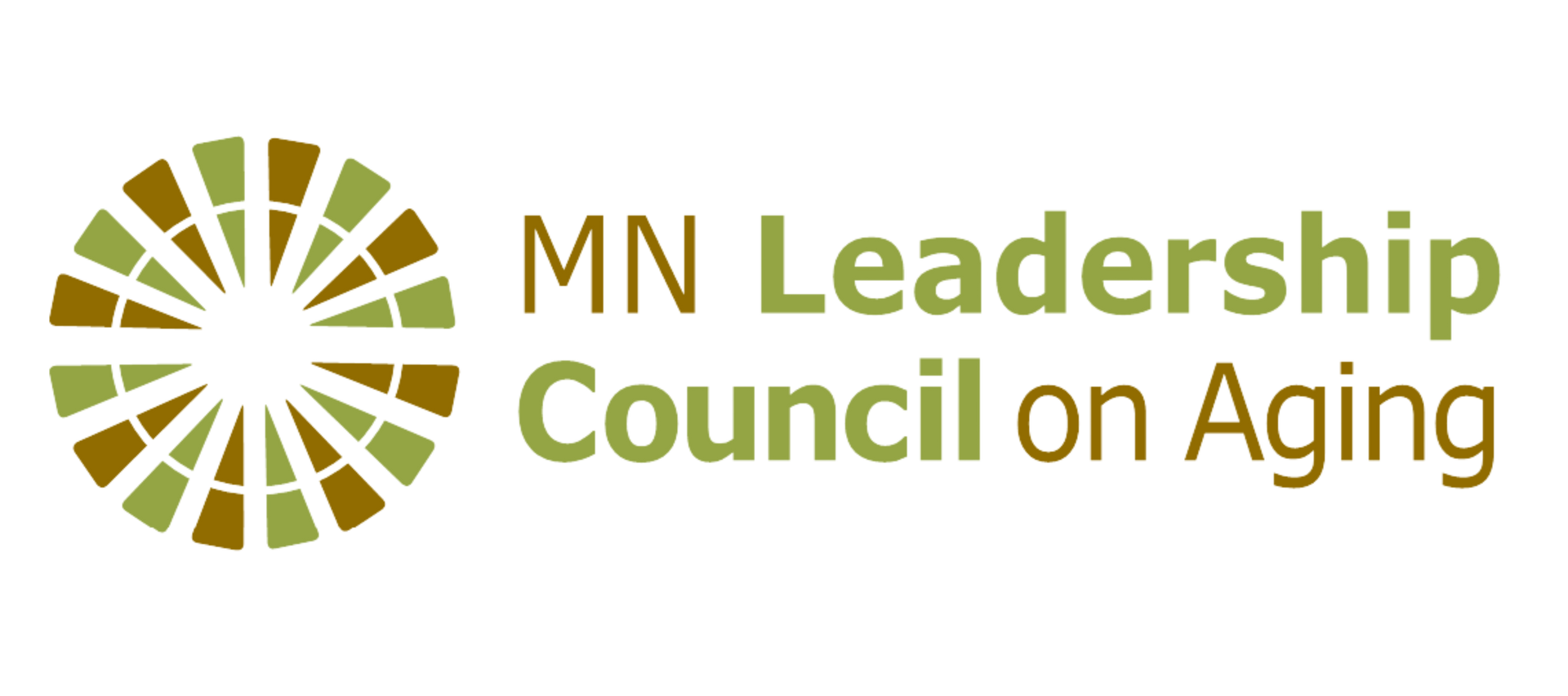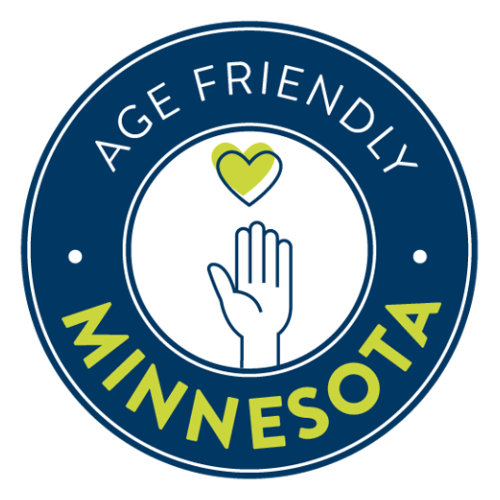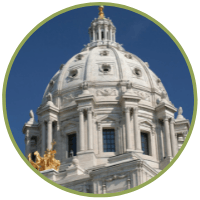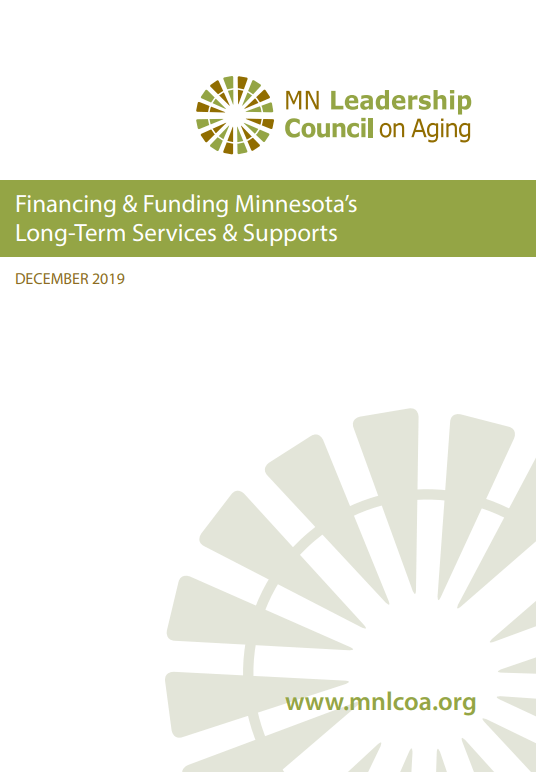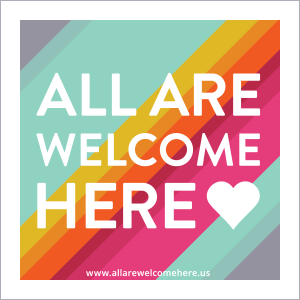A Strong Record of Policy Leadership
2025 Policy Priorities
Sector-wide Letter
Our May 20, 2025 joint letter to Human Services Conferees from the Minnesota Board on Aging and Age-Friendly Minnesota Council.
Age-Friendly Minnesota Council
- We support a policy proposal at the Legislative Task Force on Aging and in the 2025 Legislative Session that makes permanent the needed authority and funding to continue the Age-Friendly Minnesota Council, including community grantmaking and Multisector Blueprint for Aging efforts. Learn more >
Home Care Investments
- We support a proposal to increase access to home care services though targeted investments, including increasing MA home care services reimbursement rates, establishing reimbursement for a limited number of required care evaluation visits, and establishing a Home Care Careers Recruitment and Retention grant.
Default Surrogate Consent
- We support a proposal to add provisions in Minnesota law commonly known as “default surrogate consent” that would guide medical providers in the event an incapacitated individual is not represented by a formally appointed health care agent or court appointed guardian and has not otherwise provided applicable health care instructions.
Consumer Fraud Restitution Fund
- We support a proposal to create a state-level Consumer Fraud Restitution Fund that would help scam/fraud victims recover financially. Using civil penalty payments collected by the Attorney General from consumer fraud cases, consumers could receive restitution in cases where the AG isn’t able to collect money from scammers.
Dementia Grant Funding Increase
- We support a proposal seeking increased funding for existing dementia grants ($750,000) administered through the Minnesota Board on Aging to reach more families across Minnesota through local evidence-based programs. It is estimated at an additional $750,000 annually. HF1674/ SF 1689
Dementia Treatment Coverage
- We support a proposal to require insurance coverage for FDA-approved dementia drugs statewide. This would ensure equitable access to treatments, improving early intervention, reducing caregiver stress, lowering long-term care costs, and enhancing dignity and wellbeing for all. HF 1269/SF 1998
Dementia Staff Position at the MN Dept. of Health
- We support a proposal to fund a permanent, full-time Dementia Programs Manager to work across state agencies to coordinate efforts and reduce duplication, identify service gaps, analyze and collect data and track progress toward the Minnesota Dementia Strategic Plan. HF 794/SF 1030
Respite Grants
- We support a proposal to support caregivers, mitigate burnout, bolster the workforce, and reduce more expensive and intensive residential care by allocating funds for grants to respite care providers that help defray individual’s caregiving costs. It is estimated at $4 million this biennium in base funding. HF 1678/SF 1925
Homeless Elders Program
- We support a proposal to create stable funding for Catholic Charities’ Homeless Elders program. Established in 2008, the program has a strong reputation in the region that was enhanced by a dedicated state appropriation in 2023, which will expire in June 2025. It is estimated at $1.5 million/year in ongoing funding.
Community Care Hubs
- We support a proposal to help Juniper help older Minnesotans bridge the gaps between medical and social care by jumpstarting the infrastructure necessary to connect community organizations, healthcare providers, public health and insurers. It is estimated at $9.9 million to expand and add services and build public and private payer partnerships.
Minnesota Board on Aging Funding
- We support administrative funding that would help the MBA guide policy implementation of the Older Americans Act Final Rule and expand capacity of Senior Linkage Line Services. It is estimated at $2 million annually ongoing and includes four MBA staff and an allocation for up to three staff at six AAAs for Senior Linkage Line services. HF 1472. SF 1789
Increased Access to Supported Decision-Making
- We support proposals to 1) extend the current Supported Decision-Making grant program from June 30, 2025 to June 30, 2026, and 2) continue funding for Supported Decision-Making Grants with a $2 million investment to grants, managed by DHS.
Senior Supportive Services Program
- We support proposal to renew the 2023 one-time $11M biennial appropriation for senior meals and to establish a supportive services program in the MN Board on Aging statute to fund, through a $4M biennial appropriation, the core services of assisted transportation, homemaker and chore for older adults. The population to be served are older adults in greatest social and economic need who are not served through Medical Assistance, Essential Community Supports, Alternative Care or Elderly Waiver.
2024 Policy Priorities
The MN Leadership Council on Aging is a force in public policy discussions impacting older adults, their families and caregivers.
In the 2024 Legislative Session, our organization endorsed a series of legislative solutions:
$25 by '25
- We supported a proposal to increase wages for most employees at skilled care centers by $5/hour (for nursing assistants, this elevates the wage to $25/hour).
Elderly Waiver Benchmarks
- We supported a proposal that addresses EW being the only waiver without a rate updating function, by allowing rates to be indexed to a future value.
Value-Based Reimbursement Cost Factors
- We supported a proposal that adds a rate inflation factor to cover the 15-27 month time period between cost reports and rate increases for skilled care centers.
Trained Medication Aide Training Expansion
- We supported a proposal that expands TMA training options beyond the current higher education programs to include other MDH-approved programs.
Nursing Assistant Language Accommodation
- We supported a proposal that would allow MDH to offer a language accommodation beyond English in the current written Nursing Assistant Exam.
SNSA Private Right of Action
- We supported a proposal that would allow providers to seek legal recourse from Supplemental Nursing Staffing Agencies in situations where fines are assessed.
Housing Support in Board and Lodge
- We supported a proposal to bring Board and Lodge into the protections language limiting 30% of "unearned income" to be used toward Housing Support costs.
Elimination of the Assisted Living Verification Code
- We supported a proposal to redeploy Senior LinkAge Line resources by no longer requiring people signing an assisted living lease obtain a verification code.
Eliminating Health Disparities Initiative: Alzheimer's Focus
- We supported a proposal for the first investment in the Eliminating Health Disparities Initiative Grant in 20 years and addition of a focus on Alzheimer's Disease.
Permanent Respite Supports
- We supported a proposal to make permanent the short-term respite care supports for primary caregivers seeking to recharge their batteries or complete chores.
Healthy Aging and Alzheimer's Disease Health Curriculum
- We supported a proposal to create a voluntary health curriculum module about Healthy Aging and Alzheimer's Disease for grades 8-12.
Dementia Services Coordination
- We supported a proposal to establish a permanent, full-time Programs Manager at MDH to work across state agencies and divisions on programs and policies.
Home Care Medical Assistance Rates
- We supported a proposal that increases Medical Assistant rates for underfunded home care evaluations to be closer to the actual costs of the services provided.
Minnesota Homeless Study
- We supported a proposal that replaces fragmented and insecure funding with a streamlined and going funding for the crucial Minnesota Homeless Study.
More Homes Initiative
- We supported a proposal that expands affordable housing options and eases zoning barriers by allowing for construction of "missing middle housing" options.
Palliative Care Benefit
- We supported a proposal that creates a palliative care benefit for Medical Assistance to reimburse interdisciplinary palliative team members in all care settings.
Activities of Note
Multisector Blueprint for Aging
Led by the Age-Friendly Minnesota Council, this is an inclusive statewide effort to develop a 10-year plan for aging in Minnesota. Co-developed by communities across the state, it provides an opportunity to promote aging in all policies and programs, build relationships across different partners, raise awareness among key decision makers and lawmakers around how policies, investments, and systems impact people throughout life stages, and as a living document, can be adapted at the local level.
MN Legislative Task Force on Aging
Established by the 2023 Legislature to review and develop state resources, as well as identify and prioritize necessary supports for our aging population, and to ensure aging-related state policies are inclusive, the Legislative Task Force on Aging included Rep. Ginny Klevorn (Chair), Rep. Natalie Zeleznikar, Sen. Alice Mann, Sen. Karin Housley, Maureen Schneider, Jen Foley, Joe Gaugler and Councilwoman Agatha Armstrong. You can now read their final report or learn more >
Minnesota Leadership Council on Aging provided testimony to the Legislative Task Force on Aging on Friday, April 12, 2024. Review this excerpt recording or learn more.
Download a copy of the comments >
Learn about the Legislative Task Force on Aging >
Learn about the Age-Friendly Minnesota Blueprint >
2023 Policy Priorities
The Minnesota Leadership Council on Aging was pleased to support the following bills and thanks Minnesota lawmakers for taking action to pass meaningful progress on each of them in the 2023 Legislative Session.
- Age-Friendly Minnesota Council - SF1749/HF1971
- Housing Support - SF992/HF732
- Skilled Nursing Facility and Elderly Waiver Rate Increases - SF780/HF733
- Program for All Inclusive Care for the Elderly - SF2103/HF2283
- Home Care Rates and Policy Changes - SF902/HF584 and SF903/HF585
- Palliative Care Advisory Council SF2145/HF1940
- Seniors Meals Coalition - SF2244/HF2523
- Volunteer Driver Coalition
- Supported Decision Making - SF2397
- Respite Services - SF1020/HF1298
- Live Well at Home - SF1902/HF1851
- Culturally Relevant Alzheimer's and Dementia Awareness - SF1814/HF1852
- Native American Elders Coordinator -
SF2945/HF2876
Does "One Minnesota" Include Older Adults?
March 24, 2023
The Honorable Tim Walz, Minnesota Governor
The Honorable Melissa Hortman, Speaker of the House
The Honorable Kari Dziedzic, Senate Majority Leader
The Honorable Bobby Joe Champion, President of the Senate
Dear Governor Walz and Legislative Leaders,
I write today in response to your 2023 budget targets with an urgent request to reconsider the resources needed by chairs of the health and human services committees to ensure that Minnesota is a great state to grow up and to grow old.
Minnesota is experiencing an unprecedented demographic shift – growing older and more diverse each day – with more than one million people over age 65. The value of these older adults is woven into the fabric of our society, and each day we see how families and communities are struggling to meet our basic societal obligations.
As trusted organizations in the state’s aging sector, Minnesota Leadership Council on Aging members have worked with lawmakers to advance essential policy solutions that move us towards being an age-friendly state and address the fundamental human needs of older adults, such as meals, shelter, family supports, ideas to close equity gaps and strengthen our infrastructure, as well as to increase rates so providers can offer a service safety net and family-sustaining wages to lift a dedicated workforce – the majority of which are women and people of color – out of poverty. But the health and human services omnibus bills can’t address these societal obligations without your leadership.
I ask each of you to increase these targets and ensure “One Minnesota” extends to our state’s older adults and caregivers. Together, let us make sure our state values all people across the lifespan and doesn’t continue to leave older adults and their families behind.
Respectfully submitted,
Adam Suomala
Executive Director
Minnesota Leadership Council on Aging
Cc: MN Leadership Council on Aging Delegates, The Honorable Senator John Hoffman, The Honorable Senator Melissa Wiklund, The Honorable State Representative Mohamud Noor, and The Honorable State Representative Tina Liebling
Our Statement on Governor Walz's 2023-24 Budget
Were Older Adults an Afterthought in the Governor's Budget?
January 25, 2023
Governor Walz makes no apologies for his priority to make Minnesota the best state for kids. Nor should he; we all value how our children grow up. But our state must also have a vision for how they’ll grow old. If this budget is a moral document, elected officials must now step up to prioritize the other end of the lifespan. To ask, “how are the seniors?”
Each day, Minnesota’s one million older adults – a population that now outnumbers our school age children – prove their value is woven into the fabric of our state. They serve as experienced members of our workforce, trusted volunteers, caregivers, coaches, family leaders, champions for community issues, educators, etc. Yet this new budget fails to accurately reflect the urgent needs faced by so many families on aging issues, such as access to services, housing, caregiver supports, food insecurity, etc.
While there are some small investments in select areas impacting aging in our state, this budget now needs an infusion from leadership in the House and Senate to achieve his promise of One Minnesota. Let this be the needed conversation starter for lawmakers to elevate aging and the needed investments to ensure Minnesota can be a great place to grow up AND to grow old.
A Look Back...
2022 Endorsements
- The Program for All-Inclusive Care for the Elderly (PACE) >
- Senior Nutrition >
- End of Session Statement >
- MNLCOA is a member of the Volunteer Driver Coalition >
2021 Endorsements
- The creation of a permanent Age-Friendly Minnesota Council >
- The vaccination of Minnesotans age 60+ >
- MNLCOA is a member of the Volunteer Driver Coalition >
2020 Endorsements
- Governor's Council on an Age-Friendly Minnesota (full support)
- MNLCOA is a member of the Volunteer Driver Coalition >
- Blue Ribbon Commission (select recommendations)
2019 Endorsements
- Support of the Repeal of the sunset of the Provider Tax >
- HF 940 and SF 1370: Palliative Care Advisory Council
- HF940 Letter >
- SF1370 Letter >
Letters
- 2021 Minnesota Vaccine Allocations for Older Adults >
- 2021 Age-Friendly Minnesota Council Budget Priority >
- 2020 Age-Friendly Minnesota Recommendations >
- 2020 Blue Ribbon Commission Letter >
- 2019 MinnPost Perspective on funding aging services >
- 2019 USDA letter opposing SNAP rule change >
- 2019 DHHS Comments on Anti-Discrimination >
- 2019 DED Expiration Letter (sent to Congressional delegation) >
- 2018 Letter to Leader McConnell on PCHETA >
- 2018 Letter to Governor Dayton on elder abuse >
- 2017 Session Letter (sent to Legislative leadership) >
- 2017 Medicaid Reform (sent to Congressional delegation) >
- 2016 Op/Ed letter >
Statements/Comments
The Leadership Council is also called upon to offer statements for initiatives. Examples include:
- Support for the Age-Friendly Minnesota Recommendations >
- Minnesota can do better (elder abuse, 2017) >
- Reporting Maltreatment in Licensed Settings (2017) >
- Governor's Mental Health Task Force (2016) >
- Case Management Redesign (2016) >
Reports
